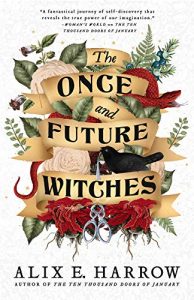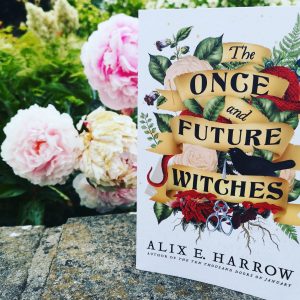THE ONCE AND FUTURE WITCHES by Alix E. Harrow (Book Review)
 I was so fortunate to receive a copy of this beautiful book, and it’s one of those stories I genuinely feel thankful to have read and to have in my life. That sounds melodramatic, and you know what I’m like, I do err on the side of drama occasionally – but there’s just something about The Once And Future Witches which haunts me and I know it’s a story I’ll treasure.
I was so fortunate to receive a copy of this beautiful book, and it’s one of those stories I genuinely feel thankful to have read and to have in my life. That sounds melodramatic, and you know what I’m like, I do err on the side of drama occasionally – but there’s just something about The Once And Future Witches which haunts me and I know it’s a story I’ll treasure.
Now I’m sure you’re wondering, what’s so good about it? I’m sure you’ve seen it doing the rounds, this won’t even be the first review of it on The Fantasy Hive. You’ve heard the noise about it – THE MAGIC THE PROSE OMG etc.
For me, Witches is absolutely deserving of the hype. On the surface, you can see why it ticks so many boxes; set in the late 1800s in America, it’s an alternative-history fantasy that follows the suffragette movement in a New England city; at its core are three wonderfully portrayed sisters with a complex relationship; the magic system is that kind of fairy-tale garden-witch Alice Hoffman kind, the kind that feels like it could very well almost be real if you believed in it hard enough…
But looking deeper than that, this is an extremely well written story that successfully appears to be quite simple, but employs all those clever little knacks to produce an effortless, and timeless, story. Harrow is quite clearly more than a mere writer, she is a story-teller, a witch of words.
“It used to be the air was so thick with magic you could taste it on your tongue like ash. Witches lurked in every tangled wood and waited at every midnight-crossroad with sharp-toothed smiles.”
It’s an enticing opening that I followed like a dream, pushing through the branches of that tangled wood but wary of that taste of ash in the air. Immediately, there’s a warning in this opening. After this introduction, chapter one introduces us to our first sister, the youngest sister, James Juniper Eastwood. I think I fell in love with her there and then as she limps onto the first page with what is quite possibly the most beautiful description of a character I have ever read:
“She was the wildest of the three. The canny one, the feral one, the one with torn skirts and scraped knees and a green glitter in her eyes, like summer-light through leaves. She knew where the whip-poor-wills nested and the foxes denned; she could find her way home at midnight on the new moon.”
 It’s just so rhythmically beautiful, isn’t it? It tells us everything we need to know about Juniper in such a romantic way; a wild spirit in tune to the magic all around her. The magic that’s around us all if we just saw it through Juniper’s glittering eyes.
It’s just so rhythmically beautiful, isn’t it? It tells us everything we need to know about Juniper in such a romantic way; a wild spirit in tune to the magic all around her. The magic that’s around us all if we just saw it through Juniper’s glittering eyes.
Harrow’s portrayal of her three protagonists is a different kind of magic again; her stunning prose weaves individualist stories into their voices that sets them wholly apart from each other. It would have been so easy for the three sisters to have become blurred – the things writers usually use to create “distinct voices”, backgrounds and motivations, are both shared between the three. Harrow harnesses the true sense of the individual, whilst bringing them together in a deep bond of sisterhood. She has expertly rendered the complexities of personality, character, and human nature. They each have a distinctive theme to their thoughts, like a colour pallette, which separates each voice and makes it distinctive and unique.
“Quinn’s hand is still resting lightly on Beatrice’s arm, and Beatrice is paying no attention to it (the pearl shine of her nails, the smudge of ink on her sleeve, the warm smell of cloves rising from her skin).”
Beatrice speaks to herself in parentheses, answering herself with a sideline snarky commentary, or an illuminating detail, that I really connected with (apparently not everyone has a running commentary in their mind!) Amaranth pictures her life in circles, who is within the circle, who is without the circle, who threatens the sanctity of her imagined boundaries. And then running wild from Beatrice’s scholarly punctuation and Amaranth’s rounded but solid edges is Juniper, with her focus on nature and her brash and impetuous emotion that flashes through like a summer squall.
Although this is a story about three sisters struggling to overcome their past and reconnect to forge a new future, for themselves and the women of their city; this is also very a much a story about stories and how they shape us. How powerful stories can be, how they can change our perceptions, how dangerous they can be gliding from the wrong tongues. I was swept along by the sisters as they worked together to find the will, the words and the way to bring magic back, but I couldn’t help wonder at Harrow’s commentary on the nature of stories, that exploration of what we think we know about something. The way knowledge is shared and carried forward, and hidden.
Ultimately there was so much to love about this book, this Jonathan Strange and Mr Norrell as written by Alice Hoffman, but there was so much that also left me thinking. It sang to something deep within me, the superstitious little girl who always politely greeted Mr Magpie and would never ever pick a hawthorn blossom. I was heartbroken by the end. Left bereft that the story had to end. But very much looking forward to what Alix E. Harrow brings us next.
